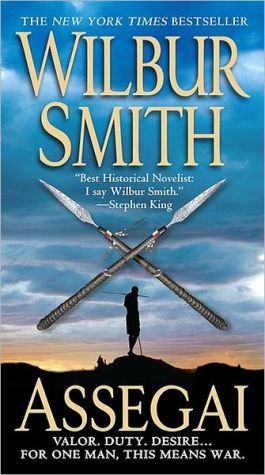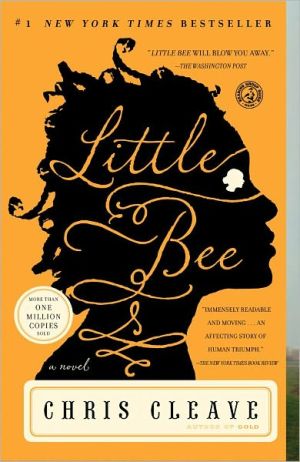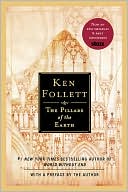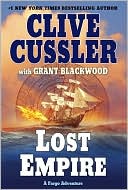Assegai
Wilbur Smith has won acclaim worldwide as the master of the historical novel. Now, in Assegai he takes readers on an unforgettable African adventure set against the gathering clouds of war.\ It is 1913 and Leon Courtney, an ex-soldier turned professional hunter in British East Africa, guides the rich and powerful from America and Europe on big-game safaris. Leon had never sought fame, but an expedition alongside U.S. President Theodore Roosevelt has made him one of the most sought-after...
Search in google:
In this unforgettable adventure, set during the World War I era, Leon Courtney stumbles on a plot that could wipe out the British forces in Africa.Publishers WeeklySmith continues the saga of the Courtney family of Africa begun in 1964 with When the Lion Feeds. In this installment, Leon Courtney, ladies' man and former lieutenant in the King's African Rifles, becomes a professional big game hunter and safari guide in the years leading up to WWI. Among his clients are Kermit Roosevelt, son of President Teddy Roosevelt, and a spoiled German princess who is fond of the whip. The story really doesn't kick into gear until halfway through, on the eve of war, when Courtney's uncle, Brig. Gen. Penrod Ballantyne, commander of the British forces in East Africa, asks him to spy on his newest client, Count Otto von Meerbach, a German industrialist with a secret agenda. Courtney also begins an affair with Otto's mistress, Eva, who has a secret life of her own. Will Courtney defeat Otto's dastardly scheme and rescue Eva? Though the outcome is never in doubt, Smith manages to serve up adventure, history and melodrama in one thrilling package that will be eagerly devoured by series fans. (May)Copyright © Reed Business Information, a division of Reed Elsevier Inc. All rights reserved.
Assegai\ \ By Smith, Wilbur \ Thomas Dunne Books\ Copyright © 2009 Smith, Wilbur\ All right reserved.\ ISBN: 9780312567248 \ \ \ AUGUST 9, 1906, was the fourth anniversary of the coronation of Edward VII, King of the United Kingdom and the British Dominions, and Emperor of India. Coincidentally it was also the nineteenth birthday of one of His Majesty’s loyal subjects, Second Lieutenant Leon Courtney of C Company, 3rd Battalion 1st Regiment, The King’s African Rifles, or the KAR, as it was more familiarly known. Leon was spending his birthday hunting Nandi rebels along the escarpment of the Great Rift Valley in the far interior of that jewel of the Empire, British East Africa. The Nandi were a belligerent people much given to insurrection against authority. They had been in sporadic rebellion for the last ten years, ever since their paramount witch doctor and diviner had prophesied that a great black snake would wind through their tribal lands belching fire and smoke and bringing death and disaster to the tribe. When the British colonial administration began laying the tracks for the railway, which was planned to reach from the port of Mombasa on the Indian Ocean to the shores of Lake Victoria almost six hundred miles inland, the Nandi saw the dread prophecy being fulfilled and the coals of smouldering insurrection flared up again. They burned brighter as the head of the railway reached Nairobi, thenstarted westwards through the Rift Valley and the Nandi tribal lands down towards Lake Victoria. When Colonel Penrod Ballantyne, the officer commanding the KAR regiment, received the dispatch from the governor of the colony informing him that the tribe had risen again and were attacking isolated government outposts along the proposed route of the railway he remarked, with exasperation, ‘Well, I suppose we shall just have to give them another good drubbing.’ And he ordered his 3rd Battalion out of their barracks in Nairobi to do just that. Offered the choice, Leon Courtney would have been otherwise occupied on that day. He knew a young lady whose husband had been killed quite recently by a rampaging lion on their coffee shamba in the Ngong Hills a few miles outside the colony’s fledgling capital, Nairobi. As a fearless horseman and prodigious striker of the ball, Leon had been invited to play at number one on her husband’s polo team. Of course, as a junior subaltern, he could not afford to run a string of ponies, but some of the more affluent club members were pleased to sponsor him. As a member of her deceased husband’s team Leon had certain privileges, or so he had convinced himself. After a decent interval had passed, when the widow would have recovered from the sharpest pangs of her bereavement, he rode out to the shamba to offer his condolences and respect. He was gratified to discover that she had made a remarkable recovery from her loss. Even in her widow’s weeds Leon found her more fetching than any other lady of his acquaintance. When Verity O’Hearne, for that was the lady’s name, looked up at the strapping lad in his best uniform, slouch hat, with the regimental lion and elephant tusk side badge, and burnished riding boots, she saw in his comely features and candid gaze an innocence and eagerness that roused some feminine instinct in her that at first she supposed was maternal. On the wide, shady veranda of the homestead she served him tea and sandwiches spread with The Gentleman’s Relish. To begin with, Leon was awkward and shy in her presence, but she was gracious and drew him out skillfully, speaking in a soft Irish brogue that enchanted him. The hour passed with startling rapidity. When he rose to take his leave she walked with him to the front steps and offered her hand in farewell. ‘Please call again, Lieutenant Courtney, if you are ever in the vicinity. At times I find loneliness a heavy burden.’ Her voice was low and mellifluous and her little hand silky smooth. Leon’s duties, as the youngest officer in the battalion, were many and onerous so it was almost two weeks before he could avail himself of her invitation. Once the tea and sandwiches had been despatched she led him into the house to show him her husband’s hunting rifles, which she wished to sell. ‘My husband has left me short of funds so, sadly, I am forced to find a buyer for them. I hoped that you, as a military man, might give me some idea of their value.’ ‘I would be delighted to assist you in any possible way, Mrs O’Hearne.’ ‘You are so kind. I feel that you are my friend and that I can trust you completely.’ He could find no words to answer her. Instead he gazed abjectly into her large blue eyes for by this time he was deeply in her thrall. ‘May I call you Leon?’ she asked, and before he could answer she burst into violent sobs. ‘Oh, Leon! I am desolate and so lonely,’ she blurted, and fell into his arms. He held her to his chest. It seemed the only way to comfort her. She was as light as a doll and laid her pretty head on his shoulder, returning his embrace with enthusiasm. Later he tried to re-create exactly what had happened next, but it was all an ecstatic blur. He could not remember how they had reached her room. The bed was a big brass-framed affair, and as they lay together on the feather mattress the young widow gave him a glimpse of Paradise and altered for ever the fulcrum on which Leon’s existence turned. Now these many months later, in the shimmering heat of the Rift Valley, as he led his detachment of seven askari, locally recruited tribal troops, in extended order with bayonets fixed, through the lush banana plantation that surrounded the buildings of the district commissioner’s headquarters at Niombi, Leon was thinking not so much of his duties as of Verity O’Hearne’s bosom. Out on his left flank Sergeant Manyoro clicked his tongue against the roof of his mouth. Leon jerked back from Verity’s boudoir to the present and froze at the soft warning. His mind had been wandering and he had been derelict in his duty. Every nerve in his body came up taut as a fishing line struck by a heavy marlin deep in the blue waters of the Pemba Channel. He lifted his right hand in the command to halt and the line of askaris stopped on either side of him. He glanced from the corner of his eye at his sergeant. Manyoro was a morani of the Masai. A fine member of that tribe, he stood at well over six feet, yet he was as slim and graceful as a bullfighter, wearing his khaki uniform and tasselled fez with panache, every inch the African warrior. When he felt Leon’s eyes on him he lifted his chin. Leon followed the gesture and saw the vultures. There were only two, turning wing-tip to wing-tip high above the rooftops of the boma, the government’s district-administration station at Niombi. ‘Shit and corruption!’ Leon whispered softly. He had not been expecting trouble: the centre of the insurrection was reported seventy miles further west. This government outpost was outside the traditional boundaries of the Nandi tribal grounds. This was Masai territory. Leon’s orders were merely to reinforce the government boma with his few men against any possibility that the insurrection might boil over the tribal borders. Now it appeared that that had happened. The district commissioner at Niombi was Hugh Turvey. Leon had met him and his wife at the Settlers’ Club ball in Nairobi the previous Christmas Eve. He was only four or five years older than Leon but he was in sole charge of a territory the size of Scotland. Already he had earned a reputation as a solid man, not one to let his boma be surprised by a bunch of rebels. But the circling birds were a sinister omen, harbingers of death. Leon gave the hand signal to his askari to load, and the breech bolts snickered as the .303 rounds were cranked up into the chambers of the long-barreled Lee-Enfields. Another hand signal and they went forward cautiously in skirmishing formation. Only two birds, Leon thought. They might be strays. There would have been more of them if . . . From directly ahead he heard the loud flapping of heavy wings and another vulture rose from beyond the screen of banana plants. Leon felt the chill of dread. If the brutes are settling that means there’s meat lying out there, dead meat. Again he signaled the halt. He stabbed a finger at Manyoro, then went forward alone, Manyoro backing him. Even though his approach was stealthy and silent he alarmed more of the huge carrion-eaters. Singly and in groups they rose on flogging wings into the blue sky to join the spiraling cloud of their fellows. Leon stepped past the last banana plant and stopped again at the edge of the open parade-ground. Ahead, the mud-brick walls of the boma glared, with their coating of limewash. The front door of the main building stood wide open. The veranda and the baked-clay surface of the parade-ground were littered with broken furniture and official government documents. The boma had been ransacked. Hugh Turvey and his wife, Helen, lay spreadeagled in the open. They were naked and the corpse of their five-year-old daughter lay just beyond them. She had been stabbed once through her chest with a broad-bladed Nandi assegai. Her tiny body had drained of blood through the massive wound, so her skin shone white as salt in the bright sunlight. Both her parents had been crucified. Sharpened wooden stakes had been driven through their feet and hands into the clay surface. So the Nandi have learned something at last from the missionaries, Leon thought bitterly. He took a long, steady look around the border of the parade-ground, searching for any sign that the attackers might still be near by. When he was satisfied that they had gone, he went forward again, stepping carefully through the litter. As he drew closer to the bodies he saw that Hugh had been crudely emasculated and that Helen’s breasts had been cut off. The vultures had enlarged the wounds. The jaws of both corpses had been wedged wide apart with wooden pegs. Leon stopped when he reached them and stared down at them. ‘Why are their mouths prised open?’ he asked, in Kiswahili, as his sergeant came up beside him. ‘They drowned them,’ Manyoro answered quietly, in the same language. Leon saw then that the clay beneath their heads was stained where some spilled liquid had dried. Then he noticed that their nostrils had been plugged with balls of clay – they must have been forced to draw their last breaths through their mouths. ‘Drowned?’ Leon shook his head in incomprehension. Then, suddenly, he became aware of the sharp ammonia stink of urine. ‘No!’ ‘Yes,’ said Manyoro. ‘It is one of the things the Nandi do to their enemies. They piss in their open mouths until they drown. The Nandi are not men, they are baboons.’ His contempt and tribal enmity were undisguised. ‘I would like to find those who did this,’ Leon muttered, disgust giving way to anger. ‘I will find them. They have not gone far.’ Leon looked away from the sickening butchery to the heights of the escarpment that stood a thousand feet above them. He lifted his slouch hat and wiped the sweat from his brow with the back of the hand that held the Webley service revolver. With a visible effort he brought his emotions under control, then looked down again. ‘First we must bury these people,’ he told Manyoro. ‘We cannot leave them for the birds.’ Cautiously they searched the buildings and found them deserted, with signs that the government staff had fled at the first hint of trouble. Then Leon sent Manyoro and three askari to search the banana plantation thoroughly and to secure the outside perimeter of the boma. While they were busy, he went back to the Turveys’ living quarters, a small cottage behind the office block. It had also been ransacked but he found a pile of sheets in a cupboard that had been overlooked by the looters. He gathered up an armful and took them outside. He pulled out the stakes with which the Turveys had been pegged to the ground, then removed the wedges from their mouths. Some of their teeth were broken and their lips had been crushed. Leon wetted his neckerchief with water from his canteen and wiped their faces clean of dried blood and urine. He tried to move their arms to their sides but rigor mortis had stiffened them. He wrapped their bodies in the sheets. The earth in the banana plantation was soft and damp from recent rain. While he and some of the askari stood guard against another attack, four others went to work with their trenching tools to dig a single grave for the family. Excerpted from Assegai by Wilbur Smith Copyright © 2009 by Wilbur Smith Published in 2009 by St. Martin’s Press All rights reserved. This work is protected under copyright laws and reproduction is strictly prohibited. Permission to reproduce the material in any manner or medium must be secured from the Publisher \ \ Continues... \ \ \ \ Excerpted from Assegai by Smith, Wilbur Copyright © 2009 by Smith, Wilbur. Excerpted by permission.\ All rights reserved. No part of this excerpt may be reproduced or reprinted without permission in writing from the publisher.\ Excerpts are provided by Dial-A-Book Inc. solely for the personal use of visitors to this web site. \ \
\ From Barnes & NobleIn 1913, on the eve of World War I, covert operative Leon Courtney learns that Count Otto von Meerbach has hatched a plot to annihilate the British forces in Africa. To stymie the plan, this former second lieutenant slips easily into a new identity as a professional big game hunter. As the machinations and counter-machinations proceed, Courtney discovers that he has two enemies: Von Meerbach and his own heart. This fine British spy has fallen in love with his archenemy's mistress. A captivating historical thriller by the author of River God and Power of the Sword.\ \ \ \ \ Publishers WeeklySmith continues the saga of the Courtney family of Africa begun in 1964 with When the Lion Feeds. In this installment, Leon Courtney, ladies' man and former lieutenant in the King's African Rifles, becomes a professional big game hunter and safari guide in the years leading up to WWI. Among his clients are Kermit Roosevelt, son of President Teddy Roosevelt, and a spoiled German princess who is fond of the whip. The story really doesn't kick into gear until halfway through, on the eve of war, when Courtney's uncle, Brig. Gen. Penrod Ballantyne, commander of the British forces in East Africa, asks him to spy on his newest client, Count Otto von Meerbach, a German industrialist with a secret agenda. Courtney also begins an affair with Otto's mistress, Eva, who has a secret life of her own. Will Courtney defeat Otto's dastardly scheme and rescue Eva? Though the outcome is never in doubt, Smith manages to serve up adventure, history and melodrama in one thrilling package that will be eagerly devoured by series fans. (May)\ Copyright © Reed Business Information, a division of Reed Elsevier Inc. All rights reserved.\ \ \ Library JournalThe world is on the brink of World War I in Smith's epic of the Dark Continent. Big-game hunter and British army reserve officer Leon Courtney (of the Courtney family, last depicted by Smith in The Triumph of the Sun) also spies for the British in this graphic, colorful, and vivid novel of intrigue, romance, and violence. In short, Smith is up to his usual exciting stuff. A brutish German nobleman, Count von Meerbach plans to incite hard-line Boers to rebel against England; Courtney tries to stop it and, along the way, falls in love with Meerbach's beautiful mistress, who is also more than she appears to be. Africa in 1913 was a cruel and often brutal land but one of exquisite beauty, and Smith describes it in great detail. He is deeply sympathetic to the native peoples and their dealings with Europeans. Although sometimes overly florid when it comes to the language of romance, Smith here delivers for fans of good, action-filled historical fiction. [See Prepub Alert, LJ1/09.]\ —Robert Conroy\ \ \ \ \ \ Kirkus ReviewsSmith (The Quest, 2007, etc.) delivers plenty of the usual high-pitched adventure and old-fashioned prose in his latest addition to the interminable Courtney family saga. The regressive hero carrying the day this go-round is Leon Courtney, a neophyte hunter in British East Africa grappling with politics, intrigue and the local fauna. Court-martialed in 1906 over a botched assault on a tribal war party, the 19-year-old second lieutenant resigns his commission to throw in with veteran elephant hunter Percy Phillips. Simultaneously, Courtney's uncle, Penrod Ballantyne, who commands local British forces, surreptitiously assigns his nephew to keep an eye on German settlers to the south. Much of the book's first half is occupied by yet another epic safari. This time, Courtney accompanies popular U.S. President Teddy Roosevelt and his discouraged son Kermit; Smith does his best work in describing the party's encounters with rampaging elephants and great-maned lions. Things slow down considerably in the second half, which finds Leon assigned to spy on Count Otto Von Meerbach, a German industrialist embroiled in a scheme to smuggle war funds via the titular airship. The action sequences are straightforward enough, but the hoary tales of the Courtneys are about as contemporary as an H. Rider Haggard novel, and it's hard to get past those pitfalls. The book's racist caricatures ("Some like chocolate-but I prefer vanilla," Von Meerbach sneers) and Courtney's stereotypically immodest conquests, among them an Irish widow, a murderous German princess and Von Meerbach's mistress, make James Bond look like a model of political correctness by comparison. Lions, hunters, dirigibles and wanton women don'tnecessarily mean something for everyone. $100,000 ad/promo\ \ \ \ \ BooklistThe highly popular historical novelist returns with another guaranteed best-seller. In the early 1900s, Second Lieutenant Leon Courtney decides to hang up his military career after a near-fatal mission in British East Africa (and a subsequent court-martial proceeding instigated by a vindictive superior office). He takes up big-game hunting, but that's only his cover: in reality, he is working as a spy, gathering intelligence for his uncle Penrod Ballantyne. Leon's target is Count Otto Von Meerbach, a German weapons manufacturer (the novel is set only a handful of years before World War I), but Leon doesn't count on falling in love with the target's seductive mistress, Eva. Can Leon foil Von Meerbach's plot to foment an African rebellion and, at the same time, protect the beautiful Eva? There is a reason Smith is a hugely popular writer of historical novels: his remarkable talent for re-creating historical periods and crafting characters we care about is virtually unmatched in the genre. Smith's novels of the Courtney and Ballantyne families (in 2005, he brought the two sagas together in The Triumph of the Sun) have been entertaining readers for nearly five decades, and if this novel is any indication, he is showing no signs of slowing down.\ — David Pitt\ \ \ \ \ \ From the Publisher“Best historical novelist: I say Wilbur Smith.” —Stephen King\ “Smith is a master.” —Publishers Weekly\ “One of the world’s most popular adventure writers.” —The Washington Post Book World\ “Smith is a captivating storyteller.” —The Orlando Sentinel\ “A rare author who wields a razor-sharp sword of craftsmanship.” —Tulsa World\ “Wilbur Smith is one of those benchmarks against whom others are compared” —The Times (UK)\ “No one does adventure quite like Smith.” —Daily Mirror (UK)\ “ ‘A thundering good’ read is virtually the only way of describing Wilbur Smith’s books” —The Irish Times\ “The world’s leading adventure writer.” —The Daily Express (UK)\ \ \ \ \ \ Booklist\ - David Pitt\ The highly popular historical novelist returns with another guaranteed best-seller. In the early 1900s, Second Lieutenant Leon Courtney decides to hang up his military career after a near-fatal mission in British East Africa (and a subsequent court-martial proceeding instigated by a vindictive superior office). He takes up big-game hunting, but that's only his cover: in reality, he is working as a spy, gathering intelligence for his uncle Penrod Ballantyne. Leon's target is Count Otto Von Meerbach, a German weapons manufacturer (the novel is set only a handful of years before World War I), but Leon doesn't count on falling in love with the target's seductive mistress, Eva. Can Leon foil Von Meerbach's plot to foment an African rebellion and, at the same time, protect the beautiful Eva? There is a reason Smith is a hugely popular writer of historical novels: his remarkable talent for re-creating historical periods and crafting characters we care about is virtually unmatched in the genre\ \








